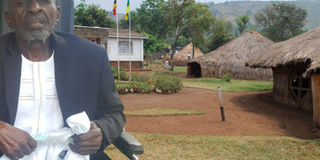Bwambale helped found Rwenzururu Kingdom

A photo montage of Ezron Bwambale and Rwenzuru Kindom’s Buhikira Royal Palace in Kasese Town. Photo Henry Lubega/ File
His grandson wheels him from the house in a black wheelchair to a shade under a mango tree in the compound. Beneath his dark blue coat is a white round collar shirt, and in his hands is a small hand towel.
Ezron Bwambale, 90, was a member of the Tooro parliament representing Bwera Kasesa. He was the one who led the Bakonzo walkout in the Tooro parliament leading to the declaration of the Rwenzururu movement.
When party politics spread across the country, he become the first Mukonzo in the first national Parliament and also the only Mukonzo to have attended the two Lancaster conferences, and the first Mukonzo to meet a sitting American President. During his time as a Member of Parliament for Tooro West, he was kidnapped by the Rwenzururu movement fighters, who allegedly speared him and left him for dead on Rwenzori mountain.
“After training as the first Mukonzo English lay reader at Bishop Tucker Theological College in Mukono [now Uganda Christian University], I returned home and got involved in politics when the party politics in the 1950s started. It was for this reason that I was expelled from the church ministry and I concentrated on politics.
I was a member of Uganda Peoples Congress (UPC) party, but during the 1962 General Elections, I was sidelined in favour of Bazarabusa for the party ticket. I decided to cross to the Democratic Party (DP). I stood against my former party’s candidate in the constituency of Tooro South and I defeated him. I went to parliament as a DP member. It was while there that I decided to go back to my original party, UPC.
Earlier, I had been a member of Tooro parliament representing Bwera Kasesa. During one of the sessions, the Omuhikirwa (prime minister), Samson Rusoke, made a statement to the effect that no Mukonzo would ever become a prime minister in the kingdom. By then, there were some Bakonzo who had expressed interest in the post. I led a walkout of Bakonzo members of parliament in protest. From the parliament, we went to Bukuku, where the declaration or the formation of the Rwenzururu movement was made.
However, my relationship with the movement did not last long. Self-interests and greed soon took centre-stage. The movement started to liberate the people of the mountains, who were oppressed and discriminated against by the Tooro Kingdom, but it turned out to be murderous. I disagreed with the impunity of forceful financial contribution to sustain the movement.
When I went to the national Parliament, the leaders of the Rwenzururu movement thought I was going to advance their demands at the national level. But I had cut ties with the movement.
Almost killed
One morning, in February 1963, while addressing a group of farmers in Kinyamaseke Market, a group of Rwenzururu fighters, armed with spears, bows and arrows, attacked us and kidnapped me.”
Writing in his book: Celebrating Literacy in the Rwenzori Region, Amos Mubungu Kambere says the kidnap was on the orders of the Rwenzururu ‘president’ Isaya Mukirania. “The Rwenzururu president had ordered that Bwambale be brought before his council court to answer charges as to why he had decided to side with the Tooro leadership and not introduced a motion in parliament seeking a separate district for his people,” Mubungu writes in the book.
“I was taken up in the mountains, beaten and speared several times, leaving me with lifetime scars. At a place called Kabingo, they left me there, thinking I was dead. That is where my rescuers found me and took me to Kilembe hospital.
The next day, a police helicopter picked me up and took me to Mulago hospital, where I stayed for a week. I later got to know those who wanted to kill me. Fortunately, they were arrested and faced the law. Personally, I forgave them. I am sure they learnt their mistakes.
Having played a leading role in the formation of the Rwenzururu movement, I now hate the whole idea because it turned out to be a movement of killing.”




